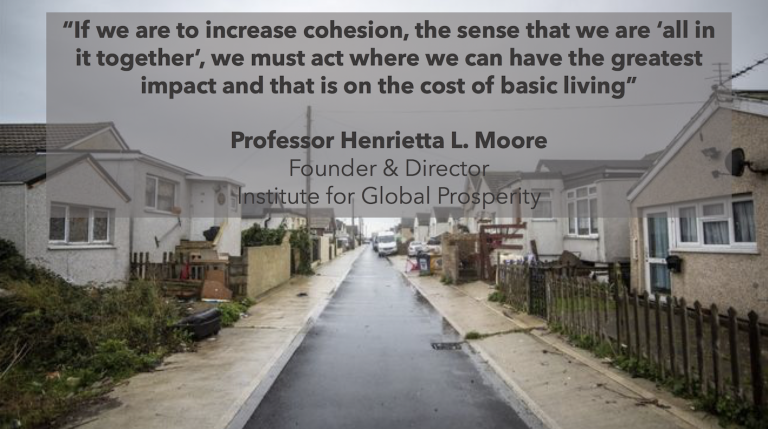We are ‘all in it together’
24 September 2019

Image credit: Coombesy - Pixabay
Over the past 30 decades, prosperity – understood as material wealth, social wellbeing, equality, justice, inclusion and environmental sustainability – has become central to public policy in the context of rising inequality and poverty, the advance of automation and the increasing precariousness work conditions, the socio-economic effects of globalisation and climate emergency. Yet gaps remain between locally situated experiences of prosperity and its operationalisation in policy frameworks. There is an urgent need for rethinking how knowledge for public policies is created, going beyond the redistribution of wealth towards improving social wellbeing.
Universal basic services (UBS)
UBS is a policy proposal aimed at tackling poverty, reducing inequalities and improving wellbeing for all. With its ongoing research on UBS the Institute for Global Prosperity (IGP) leads the effort to promote a more socially orientated vision of the future and offers ideas about how to deliver quality of life for the UK, improve public services in ways that are affordable, and link radical policy initiatives to improved social integration and cohesion.
“Without radical new ideas that challenge the status quo, we face a future where the changing shape of our society and labour market leaves more and more people struggling simply to achieve the basics – let alone having the resources and mental energy to allow themselves and their families to flourish”, says Professor Henrietta Moore, Director of UCL’s Institute for Global Prosperity. “The safety net of a society must be just as modern as its economy. Universally available public services have the potential to provide the flexible, need-specific, and responsive support that could replace much of our current, conditional benefits, while also preserving the value of paid work, conforming with public attitudes, and building social institutional fabric at the same time,” adds Andrew Percy, Co-Director of the Social Prosperity Network.
Two principles are fundamental to the rationale for UBS: shared needs and collective responsibilities. We all share certain basic needs that must be satisfied if we are to be able to survive and thrive, think for ourselves and participate in society. The aim is to improve the quality and reach of existing services such as healthcare and education, and to extend this approach into areas such as care, transport and information. “If we are to increase cohesion, the sense that we are ‘all in it together’, we must act where we can have the greatest impact and that is on the cost of basic living”, says Professor Henrietta Moore.

Image credit: BBC.co.uk
An important aspect of UBS is the opportunity it could give to rejuvenate local democracy and local involvement in the design, financing and delivery of local services.
UBS lies at the centre of IGP’s commitment to re-thinking prosperity through public debate around new ideas; sustainable investment in social infrastructures; and public policy aimed at improving the quality of people’s lives. IGP has several strands of work focused on developing visions of what prosperity means for the UK in the 21st century; firstly by establishing collaborative dialogues with expert multi-stakeholder groups for developing sustained shifts in policy debates and practice; and secondly by sharing new methods for engaging citizens in the production of knowledge to inform public policy. IGP’s Prosperity Index and Universal Basic Services are two elements of this work. Whilst the Prosperity Index focusses on informing policy ‘from the ground’ and involving local people, UBS contributes to enhancing people’s opportunities and capabilities to participate in society and prosper beyond wealth through the extension and enhancement of basic services.
IGP’s vision is to help build a prosperous, sustainable, global future, underpinned by the principles of fairness and justice, and allied to a realistic, long-term vision of humanity's place in the world. Of particular importance to the IGP’s approach is the way in which it integrates non-academic expertise into its knowledge generation by engaging with decision-makers, business, civil society, and local communities. The IGP believes that citizens and communities should be at the centre of efforts to reimagine prosperity and that social science research should be carried out through long-term collaboration with local residents. All IGP research involves citizen scientists who are trained in research skills and conduct interviews with policy-makers, community leaders and residents in research sites. They use their own knowledge of the local area to inform, influence and shape the direction of research.
UKs first citizen-led Prosperity Index
Initially a project about prosperity in East London IGPs London Prosperity Index is now part of a larger agenda for developing sustainable ways to improve the quality of life of people throughout the world with transdisciplinary research teams located throughout the UK, Kenya and Lebanon (PROCOLs: Prosperity Co-Laboratories). “In every country in the world, the means and mechanisms to turn the wealth our economies generate into prosperity and to share the benefits of that prosperity more evenly across all social groups, is severely lacking”, says Professor Henrietta Moore.
Facing the current climate emergency, the challenges from globalisation, automation, and the coming social care and economy challenges of the 21st century will require more resilient communities with greater capacity and capability to develop alternative solutions specific to their place and space. IGP’s UBS and Prosperity Index are concrete policy solutions to tackle these issues closely interlinked with each other.
Individual capabilities alone are however not enough to solve these challenges. Efforts need to focus on lifting up whole communities and that means devolving power down to communities and building up community social infrastructure. Implementing solutions to the 21st century challenges will require both more meaningful, active community participation and multi-stakeholder collaboration, as well as more resilient communities with greater capacity to develop their own solutions specific to their place and space.
Moving from a primarily redistributive model for social security to a primarily service-orientated model meets needs more directly, increases efficiency, reduces costs, facilitates a vibrant private economy, and buttresses the institutional fabric of society. An enhanced services model is also likely to increase social cohesion, enabling common acceptance of the limits imposed on us by the challenges of finance, ageing, productivity and environmental degradation.
Join the conversation
#TheWayForward
#TheNewDeal
#FutureofBritain
More information can be found on the IGP's UBS Hub.
 Close
Close

